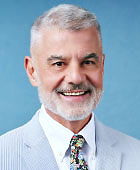Next Phase of Addiction Psychiatry Presidential Theme: Technology

The capstone to my yearlong public education and awareness campaign on addiction is a focus on technology and the technological addictions. Technology is a major part of our daily lives, and most of us are attached—if not glued—to our phones and tablets. Professional well-being, social connection, entertainment, love, family coordination, and routine life logistics seem to be inextricably linked to the virtual world. Because of how ubiquitous the use of technology is in our day-to-day lives, it can be difficult to recognize when the line has been crossed into a bona fide behavioral addiction.
In 2024, we recognize seven technological addictions: internet gaming, cybersex, social media, internet gambling, texting and emailing, infobesity, and online auctions and shopping.
Advances in technology, like more widespread access to high-speed internet, have made internet gaming, social media, and other technologies with an addictive potential more accessible to a greater swath of the population. In addition, many technologies, especially games and social media platforms, are designed to encourage repeated or prolonged use. As the use of various media increases in our society, so too are the rates of their associated addictions. Roughly 160 million American adults play some type of internet-based games, while internet gaming disorder has a prevalence of 3.05%, comparable to that of obsessive-compulsive disorder.
Like other behavioral addictions, such as non-internet-related gambling and sex and substance use disorders, technological addictions lead to functional impairment. The warning signs of technology addiction are similar to those of substance use disorders: Continued use of technology despite knowing it can have adverse consequences on relationships or physical health; lying to friends, family, or loved ones about the frequency of using technology; and constantly thinking about technology use or having cravings to use. These are all red flags that technology use may have evolved into a mental health problem.
There are many screening tools already in use for technology addiction, but no one single tool is recommended by APA at this time. Psychiatrists and mental health professionals who treat people with technological addictions borrow from our expertise in evaluating substance use disorders when screening for a technology addiction.
Our goal with this campaign is to socialize the warning signs of technology addiction and strategies to manage technology use in a healthy way to the public and our members alike. Over the next three months leading up to our Annual Meeting, APA will feature information and resources on the broad category of technology addiction as well as the most prevalent associated subcategories. Together, we can promote a healthy relationship with technology so that it can be a force for good in our lives.
Stay tuned for more information on my presidential campaign on technology and the technological addictions and be sure to check out the Annual Meeting sessions on the intersection of emerging technologies with mental health. See you in New York City, my hometown, this May! ■
Resource
Information about Annual Meeting sessions is posted in the “Session Search” tool. The next issue of Psychiatric News will include a special report on social media addiction.



